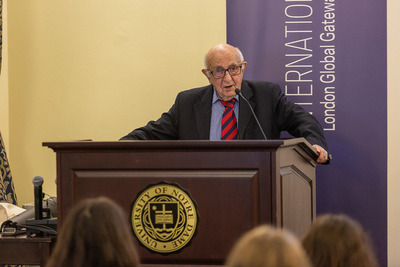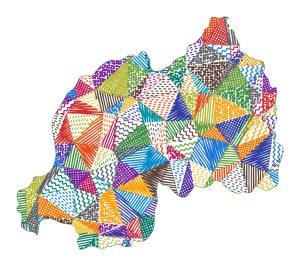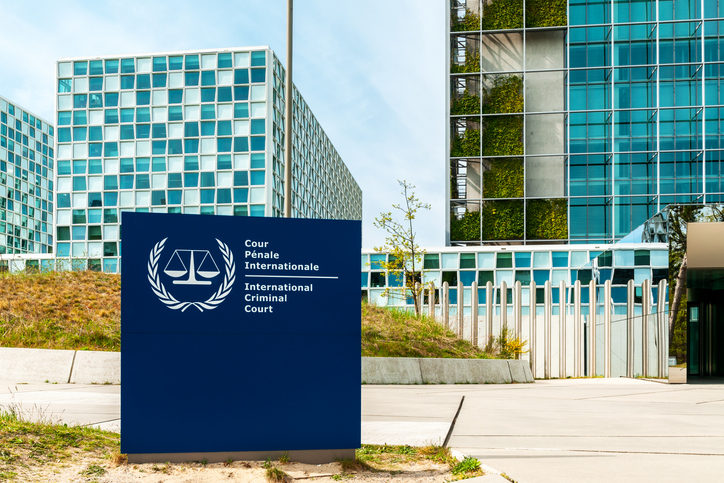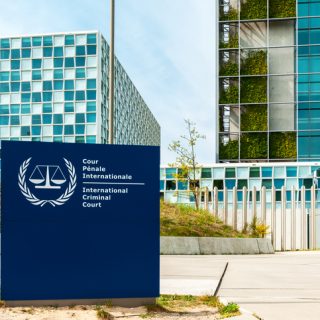The Peace Through Law lecture series is an annual event held by Notre Dame and financed generously by Thomas F. Faye in which an esteemed law professional performs a keynote speech delving into how their legal work and scholarship have led to a greater accumulation of peace through legal avenues. On this, the program’s fifth year, the esteemed Judge Theodor Meron took the stage to discuss “the characteristics and the goals of international criminal justice, the political environment in which it operates, the challenges to the fight against impunity, its achievements and shortcomings, the agendas of the different stockholders, and the role of international criminal justice in promoting peace and reconciliation.”
An introduction to Judge Meron…

Judge Meron was then appointed president of the UN Mechanism for International Tribunals in March 2012. His work within the Appeal Chamber(s) served as a model for the International Criminal Court. A leading scholar of International Humanitarian Law, Human Rights, and International Criminal law, Judge Meron is the author of a dozen books on International Law and of more than a hundred articles, including some that helped build the legal foundations of the International Criminal Tribunals. Judge Meron is one of the founding fathers of modern-day international criminal tribunals. His work acted as a foundation upon which the ICC built itself. A Titan deserving of monumentous gratitude, with a sharp wit and sharper humour.
Before we dive head first into the juicy interworkings of present-day International Criminal Law, you should know a bit more about Judge Meron. His illustrious legal career began in Israel: as a member of the Israeli Foreign Service. His duties included that of Legal Adviser to the Foreign Ministry, the Ambassador to Canada, and the United Nations in Geneva. Before emigrating to the United States, he was one of the lonely voices both in Israeli government and academia, fighting for proper treatment of Palestinians and a reduction of hostilities within West Bank territories. Since March of 2001, Judge Theodor Meron has served on the Appeals Chambers for the UN International Criminal Tribunal for the former Yugoslavia (ICTY). He acted as the tribunals elected president from 2003 to 2005, and once again in a fourth stint as president in 2011. Judge Meron also served in the Appeals Chambers of the International Criminal Tribunal for Rwanda (ICTR). This closed in 2015 but you can access the legacy website.
Now on to the good stuff, I will relay to you the highlights of the hour-long presentation. Anyone hoping to join the ever-evolving world of International Criminal Law should take note of Judge Merons’ discussion on the field’s challenges, successes, and future possibilities.
The lecture begins…
Ever the realist, Judge Meron began with the challenges facing International Criminal Law today. First and foremost, and most obviously, the international realm lacks an enforcement mechanism. The world of International Criminal Law relies entirely on State cooperation.

A good example of reliance upon state cooperation is the ICTR. The tribunal would have never existed without cooperation from the Tutsi regime. However, that cooperation cost the tribunal true equality under the law. The Tutsi regime, as they were both the main targets of the genocidal terrors and the political leaders post-conflict, would only provide Hutu defendants. This led to crimes committed by the Tutsi Rwandan Patriotic Front (RBF) to be ignored in entirety, with Tutsi forces facing not a single indictment by the ICTR.
Diving further into the first two international criminal tribunals since Nuremberg, the ICTY and ICTR, both of which Judge Meron worked on personally, he began his discussion on the challenges inherent. Firstly, the tribunals were a meeting of minds for Civil and Common Law lawyers. This ‘mind meld’ was filled with compromise and, at times, frustration. In the end, the substance of the law used within the tribunals remained Anglo-Saxon Common Law while the procedure entailed more aspects of Civil Law. The greater reliance on Civil Law led to more efficient courtroom proceedings. Such an unusual jurisdiction called for plentiful use of hearsay and written evidence alongside greater authority bestowed to the judges, especially in cases when defendants were obstructive during trials.
Onto the more obvious challenge of the tribunals, Judge Meron highlighted their extended length, and costs. He notes that this is just the nature of the beast, and realistically the situation will continue as such. The increase in cost and length of trials is due to the multiplicity of crimes, territories, and documents being handled by the tribunals and going further, the ICC. The tribunals and the ICC’s difficulties in collecting evidence can be primarily blamed on their dependence on State actors. In other words, if the state does not comply with releasing documentary evidence, the court is left in a stalemate. Justice requires evidence, and thousands of pages of documents were covered within the two tribunals and continue to be mulled through within the multiple ICC situations being investigated. After this quick ‘check under the hood,’ it is understandable that these trials take years to complete.
State dependence

Judge Meron alleges that “states continue to prioritise alliances over equal justice for all.” He questions if the international criminal system even works well, as the largest and most powerful countries in the world do not accept international jurisdiction while holding power over it in the form of an ever-looming veto through the Security Council. Notably, it can be difficult to have a court so state-funded and state-powered as the ICC. This can lead to a conflict of interest as states operate within a very political environment, and the legitimacy of the Courts is based upon impartiality and fairness. To alleviate challenging elements, Judge Meron recommends greater reliance on hybrid tribunals, allowing more of the responsibility for the prosecution to be within the hands of the states themselves, with the ICC playing more of a supportive, guiding role.
The positives of the international criminal system
Judge Meron keenly points out that “had I been speaking to you thirty years ago, I would be asking whether, ever, there would be another International criminal court— not if international criminal law works well.” We stand to witness a fleshed-out skeletal International Criminal and Humanitarian Law system. He feels optimistic about the other deterrent systems being built upon outside of legal prosecution including sanctions, seizure of assets, travel restrictions, and universal jurisdiction being used within domestic courts. The creation of the ICC has transformed state norms pertaining to individual criminal liability, as there has been an increase in national prosecutions of war crimes, both on and off their territorial soil. International prosecution has also removed abusive leaders, thus facilitating peace with Charles Taylor, the former president of Liberia, being given as an example. But, Judge Meron does note that convictions do not always translate into healing wounds. He also warns against criticism of the notable number of acquittals that occur within ICC proceedings, arguing that
“…acquittals, just as convictions, are a sign of maturity of Criminal Law systems.”
When comparing international law and criminal law to the days of Nuremberg, Judge Meron argues that today’s standards are “lightyears ahead.” During the Nuremberg trials, there was no burden of proof and no appeals. Additionally, due process was nowhere near the level we have today. Today’s conviction standard is beyond a reasonable doubt, and the death penalty is barred from use.
Judge Meron also thought it crucial to remind the audience what the actual agenda of International Criminal Law is. The system is focused on a historical recording (not historical fact-finding as that is impossible in the scope of a trial), seeking peace and reconciliation, and victim justice. Criminal Law’s obligation is to focus on due process and not on favoring a decision for the greatest reconciliation. Judge Meron is, of course, sympathetic to victims, but allowing victims too much control in the court can go against fairness and impartiality and into the realm of retribution and retaliation.
Below are some highlights from the Q&A portion of the event:
Q: In its 20-year history the ICC has had few prosecutions, and the international community is critical, are these criticisms valid?
A: Judge Meron was reluctant to place blame on the ICC for this matter. In comparison, the ICTY and ICTR, which both boasted larger conviction numbers, enjoyed the normative power of Chapter 7 of the UN Charter which made the tribunals entirely mandatory for State signatories. The ICC lacks the international support the previous criminal tribunals garnered. Why is this? Fearing future prosecution, large political powers have refused to ratify the Rome Statue the ICC is built into.
Q: Are you [Judge Meron] optimistic about justice in Ukraine?

A: Absolutely, referring first to the fact that in September 2015, Ukraine accepted the jurisdiction of ICC for crimes committed in its territory. Granting the International Criminal Court territorial jurisdiction as well as ad hoc jurisdiction. An ICC investigation has already begun, but the preparation of these trials, as stated above, takes time. The ICC tries individuals, so while we now are witnessing the crime scene, work is needed in order to establish a chain of command and the individuals involved with superior responsibility. It should be noted that under Russia’s constitution, the extradition of their citizens to face criminal investigations and trials is illegal, so justice cannot be assured.
Q: Have we plateaued? What is the future of international criminal law? What is your view of the African Union’s frustration with the ICC?
A: Judge Meron worked backward through the questions. First, in response to the African Union’s frustrations, he makes clear that many of the cases referred from Africa were referred by the State’s own political opponents, an issue on the continent, not one with the ICC. He points out that the ICC has tried prosecutions from beyond Africa (ex. Colombia) and that criticism against the ICC pales in comparison to the case in support of the ICC.
One should not be surprised that one of the foundational members of International Criminal Law still stands proudly as an active supporter. Judge Meron asserts that there is absolutely no plateau and that it is likely that the Ukraine conflict will create renewed invigoration in International Criminal Law, as forty countries partnered to the Rome Statute have filed claims against Russia. But of course, this work will take time.

Do you share Judge Meron’s realistically optimistic view on the ICC and international criminal law in general? Do let me know…
Ashley Gate is a master’s in law student specialising in international Human Rights Law. With a previous background working as a medical aid during the onset of the Covid-19 pandemic back in United States, she has a keen eye for the intersectional aspects of health inequity. Ashley has a passion for politics, history, and gardening. Ashley is a member of the 2022-23 Lawbore Journalist Team.

